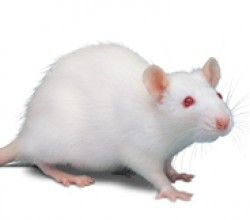
More evidence that low-calorie sweeteners are bad for your health
Studies show that artificial sweeteners can raise the risk of hypertension, metabolic syndrome, type 2 diabetes and heart disease, including stroke.

Natural Health News — Genetically modified food has been pushed onto the public as a safe way to feed the world. But a recent report by a team of international scientsts blows that supposition out of the water.
The report shows that animals fed a diet of GM corn put on weight, were less able to digest proteins and suffered immune system problems.
A long-term view
Since genetically modified (GM) food started to appear in shops in the early nineties, large quantities have been sold for human consumption – without any harmful effects, as far as we know. But is there a risk of a long-term impact?
An international research project is exploring the effects of GM food, studying the impact on rats, mice, pig and salmon. The decade-long, wide-ranging study includes researchers from Hungary, Austria, Ireland, Turkey, Australia and Norway.
“We are trying to identify which indicators we need to measure in order to explore unintentional effects from GM food,” explains lead researcher Professor Åshild Krogdahl of the Norwegian School of Veterinary Science.
“The findings could give us some understanding of the potential effects for these animal species as well as for humans”.
Rats get fat
As part of the project, a group of rats were fed corn which had been genetically modified for pest resistance. Over a period of 90 days they became slightly fatter than the control group of rats fed non-GM corn. The same effect occurred where rats were fed fish which, in turn, had eaten GM corn.
“If the same effect applies to humans, how would it impact on people eating this type of corn over a number of years, or even eating meat from animals feeding on this corn?”, he asks. “It is an interesting phenomenon and worth exploring further.”
Damage to the intestines
Examining the effects on salmon, the researchers found distinct differences between fish being fed GM food and those on a non-GM diet. Many of the changes were within ‘normal’ range, nevertheless the fish fed GM showed a distinct trend.
They were, said Krogdahl “slightly larger, they ate slightly more, their intestines had a different microstructure, they were less able to digest proteins, and there were some changes to their immune system. Blood samples also showed some change in the blood.”
Summarising the research for the US Cornucopia Institute, Anthony Samsel of the Union of Concerned Scientists notes that the inability to digest proteins has important implications for health. The proper digestion of protein is necessary for many biological functions which include providing the body with amino acids.
He writes, “This not only may relate to a rise in obesity, but to increases in many modern diseases. These diseases include diabetes, digestive disorders, inflammatory bowel disease, colitis, autism spectrum disorders (ASD) (ADD), autoimmune diseases, sexual dysfunction, sterility, asthma, COPD and many more”.
More organ damage
These subtle changes were observed in a wide range of organs, including the digestive organs, liver, kidneys, pancreas, adrenal glands and reproductive organs.
Krogdahl points out that there’s nothing inherently unusual about physiological changes after food consumption, as this happens with non-GM food as well. The question is whether changes with a GM diet could be of a different category – potentially causing harm over the long term.
As well as examining salmon intestines after GM food consumption, the researchers also looked at the intestines of rats eating the salmon. The rats ate slightly more and grew faster than their GM-free counterparts, as well as showing signs of immune system disruption.
GM ‘drift’ into vital tissues
The study disproves another long held GM myth.
“A frequent claim has been that new genes introduced in GM food are harmless since all genes are broken up in the intestines. But our findings show that genes can be transferred through the intestinal wall into the blood; they have been found in blood, muscle tissue and liver in sufficiently large segments to be identified,” Krogdahl explains.
“The biological impact of this gene transfer is unknown.”
Cast your vote against GM
The results of this and other studies into the safety of GM food demand that the Precautionary Principle applies. We need to get GM food out of our food chain and out of our fields.
If you have not yet voted in the Country File GM poll please do and let the powers that be know that you do not want GM trials to go ahead in the UK.

Please subscribe me to your newsletter mailing list. I have read the
privacy statement